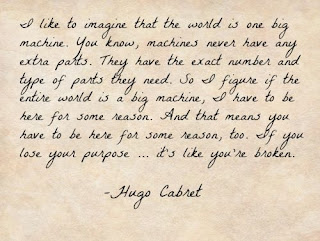I just finished watching the Martin Scorsese movie Hugo with my daughters
(ages 10 and 8 – the 8 year old is reading the book in her 2nd grade
class). Once again my writing inspiration hit me in the least likely place for the
last post in my Purpose:
Find Yours series.
The quote image of this blog post underscores a key message
in the movie: if you don’t follow your purpose, you will not be truly fulfilled
and happy in all areas of your life. Georges Méliès (Ben Kingsley) gambled
everything to follow his passion, lost it, lived miserably for years and
tearfully found it again in the least expected way. What a metaphor for life.
Now let’s get on with discovering your purpose final
exercises. Reminder of the three activities that will lead you to success:
- Conversations with your network
- Reflection
- Writing
Final Exercise – purposely
reordered:
- Writing (credit to Tara Nichole-Nelson and her inaugural Strategic Sabbatical – if she has one again, you need to be on the list to attend)
a.
Review your source material - the stuff you’ve
been writing about:
i. Spot
themes and patterns. When are you at your best? When are you at your worst?
What turns you on?
b.
What are the qualities you admire in others that
you need to or would like to develop in yourself?
c.
Think of your vision and mission are a
narrative, timeline and storyline, with you as a character.
i. What
character or role do you want to play in an organization - not a job title, but
more a character, like encourager, connector, problem solver, illuminator,
strategizer, creator, etc.
d.
What are the characteristics of settings in
which you could successfully be the character in your vision and mission? What
would you need to play that role?
- Reflection
a.
Once you’re done, run your statement(s) through
these stress tests:
i. New
narrative for life - does this vision or mission suggest the qualities,
characteristics, skills, resources you’ll need to move forward? Do they help
suggest what will be hard about fulfilling it, etc.?
ii. Stress
tests for your vision, mission, purpose statement:
iii. Vision:
Is it clear how the world or your organization or the people you impact will be
different after your work than before?
iv. Mission:
Is it clear what you do or who you are?
v. Does
it suggest several directions you could go into for your next stage?
vi. Would
your favorite job ever or a role you’ve envied pass muster?
vii. Would
they work to help you select or weed out an industry, company, job or
leader/team?
viii.
If not, can you insert or take out words or
concepts to make it pass the stress tests?
- Conversations with your network
a.
Start talking to your trusted advisors and
mentors. Use your new narrative. What are the reactions? Get feedback. Refine.
Practice.
b.
Start interviewing. Whether for a new role at
your current company, with a recruiter or during an in person interview for an
opportunity that fits your mission and purpose statement. The more you
practice, the more you will know and live your purpose statement. If it isn’t
right, keep refining with the exercises outlined in the last three posts.
Finally, don’t get frustrated. I found my purpose. I feel it
in my soul. It feels good. And I still have the hard work of staying focused
and not getting distracted by the many shiny objects that come my way.
Commit to finding the meditative and focused time alone to
focus on conversations with your network, reflection and writing. This will be
a lifelong revisit to keep me on track.
“If you lose your
purpose… it’s like you’re broken.” –
Hugo Cabret
Here’s to doing the hard work. Merry Christmas!

Comments
I blog often and I seriously appreciate your content. The article has really peaked my interest. I will take a note of your website and keep checking for new details about once per week. I opted in for your Feed as well. www.gmail.com login